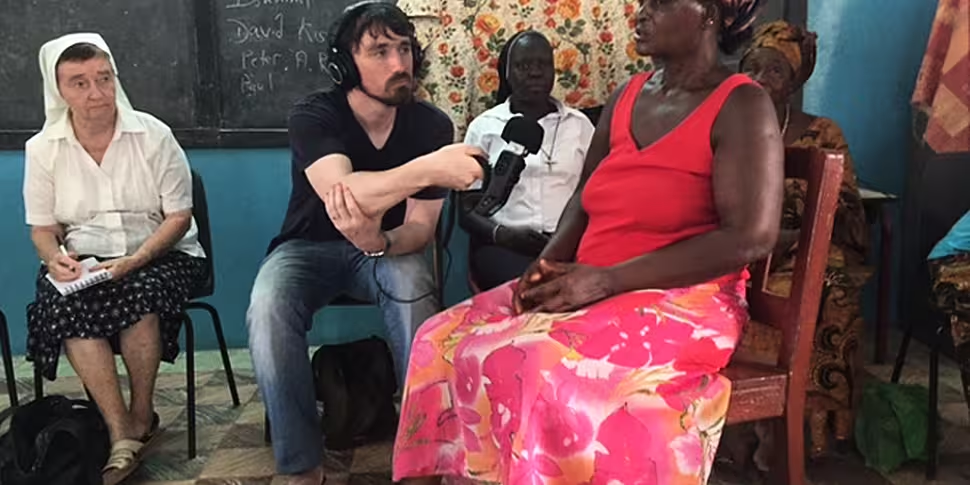One year after the Ebola crisis devastated Sierra Leone and Liberia, documentary maker Brian Kenny takes stock of the aftermath. The deadly virus that impacted so heavily in West Africa was only the beginning for many of the communities. Survivors who lived through the nightmare of this incurable virus are arguably left with their biggest challenge yet, rebuilding.
Weaving his way through communities in Sierra Leone and Liberia with Irish missionaries as his guide, Brian meets survivors, widows, and orphans. Many of these people did not believe Ebola existed or believed it was witchcraft, and often this exacerbated the risk of transmission and the failure to acquire medical treatment. The case of Ebola was a classic tale of survivors, and ‘Ebola Fighters,’ as they popularly became to be known, who risked their lives on the frontline never leaving the sides of the vulnerable communities they worked with.
For two years, from March 2014 – March 2016, West Africa experienced the largest outbreak of Ebola in history. The three countries of Sierra Leone, Liberia and Guinea were emerging from lengthy civil wars, and unfortunately were the epicentre of the outbreak. The World Health Organisation (WHO) reported 28,457 officially recorded cases, resulting in approximately 11,312 deaths but, this may be the tip of the iceberg as many went unrecorded, and the true figure is thought to be as much as three times higher.
"For a lot of people, they were just getting on their feet,” says Sr. Bridget Lacey from the Missionary Sisters of the Holy Rosary who is originally from Newport town in County Tipperary, “an awful lot of people here don't have very much. They don't really expect that much but basic housing, to be able to send their children to school, take care of medical needs, people would be satisfied if they could do that. People were beginning to feel that they were achieving that but then Ebola struck. Ebola was a different kind of war. In the civil war, you knew where the bullets were coming from, and who you were fighting. With Ebola you didn't know where it was coming from."
Ebola was a calamity in all respects. In Sierra Leone and Liberia, structures taken for granted in Ireland failed. Both countries did not have adequate hospitals, Doctors or Nurses, although they did the best they could do with what they had. Culturally, in Sierra Leone and Liberia people have a strong compassion towards the sick, and traditional burial practices encourage physical contact with the deceased. Unfortunately this only aggravated the transmission of the virus. People held these traditions as sacred during the outbreak as a way to cope with the trauma, and horror they encountered in their villages and cities.
"We had lots of phone calls and emails telling us that we shouldn't be there that we should go home. They gave us loads of good advice from a distance but you know we had gone through the war in Sierra Leone, gone through a war in Guinea, and we had not left any of those places,” says Sr. Bridget, “so we really did not feel like we were going any place.”
“We were going to stay. When we were in Guinea, the war came to where we were living, and we were actually in the town when it was attacked. Before that, people were waiting for us to go. They knew that once the sisters go we're finished. They know it's over. But we didn't go. So the same thing with Ebola. If you come here to become a missionary, you are not going to pack up, and leave when the place gets a bit difficult."
Through tears and laughter, the voices in this two part documentary series highlight people who have suffered terribly – living through the panic, mass deaths and uncoordinated response by international humanitarian organisations set up to protect them. Against the odds, people in Sierra Leone and Liberia are pushing forward to build better lives. The journey begins in the Irish Embassy in Freetown, Sierra Leone on St. Patrick’s Day 2016, the very day Sierra Leone was declared Ebola free. It ends three weeks later in Voinjama in rural Liberia amongst the laughter of three Irish Sisters who have been to hell and back with the people they have lived amongst for decades.
Between 2014 and 2015, Misean Cara provided over €500,000 to support missionary projects responding to Ebola in Sierra Leone and Liberia. These Irish and local missionaries exuded a quiet determination, and bravery in the face of a crisis that gripped the world. Many missionaries worked around the clock to offer lifesaving support to their communities despite mourning the loss of friends and colleagues.
BROADCAST DETAILS: Back from the Brink Part 1 (Sierra Leone) will be broadcast on Saturday 17th of September at 7am and re-broadcast at 10pm, and Back from the Brink Part 2 (Liberia) will be broadcast on September 24th at 7am and re-broadcast at 10pm.
LISTEN LIVE ONLINE: ‘Back From The Brink’ can also be listened to online at: www.newstalk.com.
PODCAST: Podcast available after the broadcast at: www.newstalk.com/documentaryonnewstalk
CREDITS: ‘Back From The Brink’ was produced by Brian Kenny. This series was made with the support of Misean Cara.









